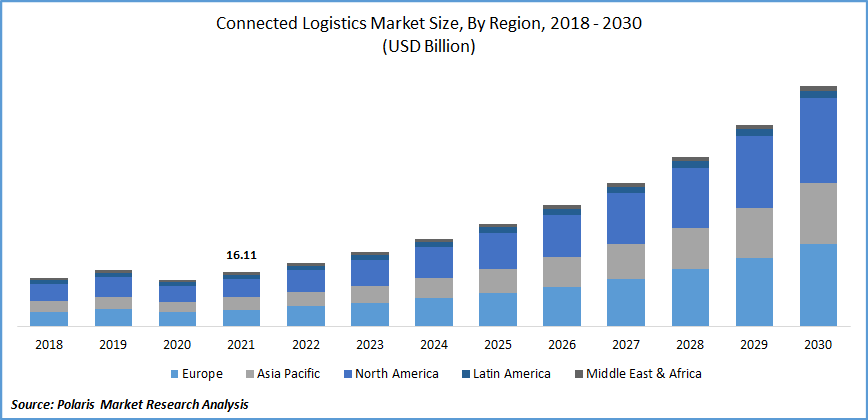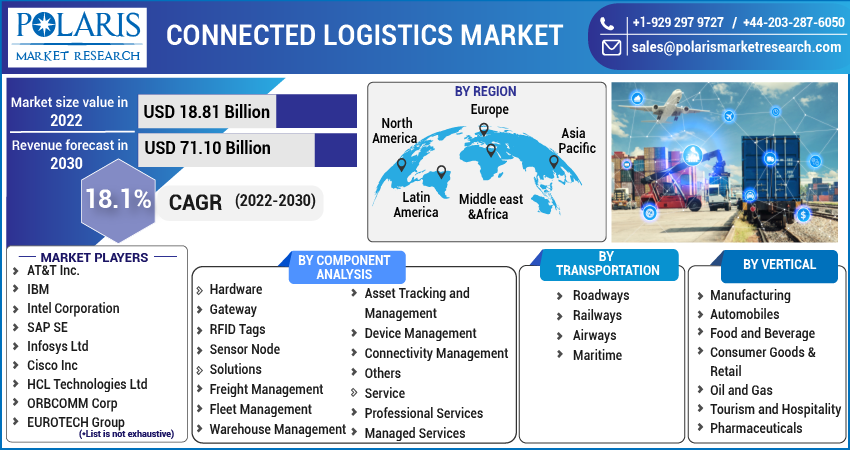
Connected Logistics Market Share, Size, Trends, Industry Analysis Report
By Component Analysis (Hardware, Solutions, Service); By Transportation; By Vertical; By Region; Segment Forecast, 2022 - 2030
- Published Date:Oct-2022
- Pages: 117
- Format: PDF
- Report ID: PM2625
- Base Year: 2021
- Historical Data: 2018-2020
Report Outlook
The global connected logistics market was valued at USD 16.11 billion in 2021 and is expected to grow at a CAGR of 18.1% during the forecast period. Big Data & advanced analytics are two emerging technologies that will accelerate the implementation of logistics 4.0 utilizing AI systems, the data gathered from logistic and supply chains that are smart and linked may be transformed into insights that can be put to use by organizations to estimate demand more precisely and enhance capacity planning.

Know more about this report: Request for sample pages
Connected logistics offers various benefits to logistics businesses providing services for varied industry verticals with real-time access, improved operational efficiency and increased productivity through integration of multiple connected platforms.
Connected logistics aid companies which are more client-focused and are engaged in enhancing productivity of transportation process. The supply chain management (SCM) system and other industries are highly adopting IoT & sensor-based technologies like RFID, which is projected to foster the growth of the connected logistic market over the forecast period.
A few other reasons propelling the market include the rising need for cloud-based services, RFID, and internet accessibility. The development of new software and cloud-based technologies for product management and transportation includes tracking of commodities and the movement of the trucks, ships, and aircraft that are involved in delivery of the shipments.
In addition, expanding economies, changing consumer lifestyles, and the rapid development of smart communities in developing nations like China, Brazil, & India are some of the major macroeconomic factors driving the industry.
Region-based subsegments of the worldwide connected logistics market include North America, Europe, Pacific Region, Latin America, and the Middle East & Africa. In terms of revenue among these regions, North America generated the highest revenue in 2020 and is expected to grow at significant CAGR by 2030.
Due to the onset of widespread COVID-19, the pandemic of 2020 had a negative impact on the worldwide logistics sector due to restrictions on domestic transit and closed border crossings for road freight transport services. Also, such lockdown measures which were implemented to stop the coronavirus spread led to supply chain disruption.
Moreover, the outbreak also had an impact on connected technology research and development. In the post-pandemic period, demands for connected logistic is predicted to grow at a high CAGR as the pandemic subsides and vaccination efforts become more common on a worldwide scale.
Leaders of connected logistics market in the United States have stated that due to pandemic, the American government has shown more flexibility towards telework and online assistance which are expected to drive the market in the forecast period further.

For Specific Research Requirements, Request for a Customized Report
Industry Dynamics
Growth Drivers
Increasing development of cloud-based technology along with usage of logistics 4.0, Bluetooth 5 and IoT, rising demand for logistic operational effectiveness, and the widespread acceptance of smart devices are some of the reasons driving the worldwide connected logistics market. The industry of logistics and transportation has experienced tremendous expansion as a result of the development of the internet of things (IoT) development and other linked technologies.
Further, technical advancement has produced more affordable, intelligent, and improved communication tools. In order to increase operational efficiency through good data exchange, these devices are being used across industries, particularly transportation and logistics. In addition, new logistical solutions are enhancing the general effectiveness of transportation services, warehouse management, and end delivery with the introduction of internet connectivity and the development of modern communication technology.
The need for on-time & real-time tracking logistics services is increased by connected logistics, which enables end users & logistic providers to adjust their supply chains to reduce delays and cancellations. Logistics companies are offering linked logistics apps to track and monitor the whole supply chain in real-time using sensors & connected devices everywhere and at any time, due to substantial advancements in IoT and associated technology.
Report Segmentation
The market is primarily segmented based on component analysis, transportation, vertical, and region.
|
By Component Analysis |
By Transportation |
By Vertical |
By Region |
|
|
|
|
Know more about this report: Request for sample pages
Solutions accounted for the largest market share in 2021
Solutions held the prominent market share among others in 2021 and is expected to be dominant throughout the forecast period. The growth in this segment can be attributed to increasing need for flexibility and efficient supply chain management. The solutions category is further sub-segmented into the following categories: freight management, fleet management, warehouse management, asset tracking and management, device management, connectivity management and others.
The hardware segment is further divided into gateway, RFID tags and sensor node. Among these, sensor node sub-segment held the significant market share due to rising need to monitor the location and speed of shipping parcels. In addition, IoT-based connected sensing technology helps in improving temperature stability and lowering the wastage of perishable products further enhancing the market growth.
Roadways is expected to witness fastest growth
Transportation mode is segmented into roadways, railways, airways and maritime. Among these, roadway segment has significant market share and is expected to continue during estimated period due to rising need to organize and manage the flow of goods related to purchasing, production, and others. Connected logistics demand is also being fueled by the growing need for transportation solutions as well as the provision of added-value services in roadway segment.
Consumer goods & retail vertical to hold significant revenue share
The consumer goods & retail sector had the greatest CAGR over the projected period. The growth in this segment can be attributed to increasing adoption of time sensitive shipments by the industry participants. This is intended to reduce average delivery time (ADT) and gain competitive advantage across the supply chain. Moreover, high demand for temperature-controlled logistics for vaccine transportation amid recovery has further bolstered segment growth.
The demand in North America is expected to witness significant growth
North America is anticipated to grow the market during forecast period with generated revenue to produce nearly USD 25.2 billion by 2030 The use of cutting-edge technologies like machine learning, the Internet of Things, cloud technology, big data, analytics, and deep learning are some of the factors which help to rise the market in North America. Due to the presence of prominent players, US maintains the largest market share in North America.
Europe is expected to hold second-largest market share during the forecast period due to the continuously expanding logistics sector, and rising demand of the market across Europe. Additionally, market expansion in the area is being fueled by rising public and private investment in the transportation sector.
Asia-Pacific is the fastest growing region during the estimated period in term of CAGR due to increasing advancement in IoT-enabled solutions for supply chain management. The Middle East and Africa witness a steady market growth due to rising demand for more energy and cost-efficient solutions.
Competitive Insight
Some of the prominent market participants operating in the connected logistics marketspace include AT&T Inc., IBM, Intel Corporation, SAP SE, Infosys Ltd., Cisco Inc, HCL Technologies Ltd, ORBCOMM Corp, EUROTECH Group, Freightgate Corporation, YUSEN LOGISTICS CO., LTD., NIPPON EXPRESS CO., LTD., SENKO Group Holdings Co., Ltd, and XPO Logistics Inc. among others.
Recent Developments
- May 2020: BluJay Solutions, a top cloud-based logistics execution platform, will be acquired by E2open Parent Holdings, Inc. for about USD 1.7 billion. E2open Parent Holdings, Inc. is a leading network-based distributor of a 100% cloud based, mission-critical, end-to-end management of supply chains platform.
- June 2021 - Northern Arc Capital has provided USD 3 million in debt funding to Holisol Logistics, which offers end-to-end (E2E) systems for managing supply chains. Due to client expectations for supply chain logistics, Holisol offers E2E solutions. The money will go into expanding the business and raising demand
Connected Logistics Market Report Scope
|
Report Attributes |
Details |
|
Market size value in 2022 |
USD 18.81 billion |
|
Revenue forecast in 2030 |
USD 71.10 billion |
|
CAGR |
18.1% from 2022 - 2030 |
|
Base year |
2021 |
|
Historical data |
2018 - 2021 |
|
Forecast period |
2022 - 2030 |
|
Quantitative units |
Revenue in USD billion and CAGR from 2022 to 2030 |
|
Segments covered |
By Component Analysis, By Transportation; By Vertical, By Region |
|
Regional scope |
North America, Europe, Asia Pacific, Latin America, Middle East & Africa |
|
Key companies |
AT&T Inc., IBM, Intel Corporation, SAP SE, Infosys Ltd., Cisco Inc, HCL Technologies Ltd, ORBCOMM Corp, EUROTECH Group, Freightgate Corporation, YUSEN LOGISTICS CO., LTD., NIPPON EXPRESS CO., LTD., SENKO Group Holdings Co., Ltd, and XPO Logistics Inc. |
